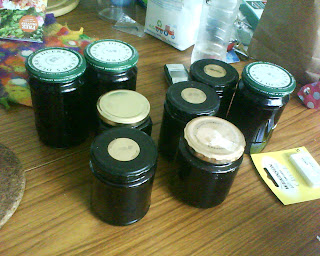 Free: Adventures on the margins of a wasteful society by Katherine Hibbert.
Free: Adventures on the margins of a wasteful society by Katherine Hibbert.I read about this book on another blog and requested it from the library. Basically it does exactly what it says on the tin. Ms Hibbert leaves her job as a journalist, packs up her possessions and walks off with just a rucksack of clothes and £20 (for emergencies) with the aim of spending a year living without money (and, one assumes, with the intention of writing a book about it). It is the story of how she spent a year squatting in derelict houses, eating out of skips and bins, living off the things that other people threw away. It is apparently not that remarkable a tale, since thousands of people live like this around the country, not included in the homeless figures and mistrusted by a society that doesn't like people on the 'outside'.
What is most interesting about the book is not so much her own adventures as the opportunity she takes to expound about the social/political/economic problems that her decision highlights: the vast quantity of disused housing alongside the homeless problem; the wastefulness of our food distribution and supermarket system; society's shift towards consumer items being disposable rather than designed for long term use. What she discovers is not a bunch of shiftless dropouts and drug addicts but a real supportive, politically active community of people who have created their own niche on the margins of society. They cooperate extensively since taking possession of an empty building requires quite a group of people. To occupy 'legally' you must 'enter' without 'breaking', then secure the building from the inside and it must remain occupied at all times. The legal owner cannot then remove you from it by force they must apply for a possession order through the courts to get you evicted. What people frequently found was that they would be ignored for months at a time because there was no urgent need to empty the building, and some groups of squatters would make agreements with owners that they could occupy the house undisturbed if they undertook to live quietly and peacefully and leave promptly without need for eviction when the owner was ready to renovate or demolish. The squatters also freely share their collected food, their skills and other resources. There are community gardens, arts and performance collectives and an advice centre run by volunteers. Some people have jobs but many live by recycling items they retrieve from skips.
The book occasionally became a repetitive diatribe against the wastefulness of our society but on the whole it was an interesting read. As someone who shops almost entirely from charity shops and ebay I am not averse to the idea of using stuff that other people want rid of, and I can see the appeal of a life without the need for paid employment. She discovered a whole new way of life that did not revolve around spending money, but on just 'needing' less, making do and enjoying things that were free. She did not acquire many possessions, there was no point getting attached to things that you might loose, though things lost were soon replaced via their regular haunts. It really did seem to change her attitude to money because when she made some money selling skipped items and it was then stolen her reaction was quite philosophical and she did not dwell on the loss or seem to feel angry about it. What I found though was that she underplayed the sense of uncertainty, that your home was never really your home, and it could be gone, repossessed and boarded up, when you get home from 'skipping' one evening just when you thought everything was going fine. It would not be something you take on lightly, although many of the people squatting were students or migrant workers (trying to live cheap and send money home to family), almost all were young and without responsibilities. The issue of having a secure home is a vital one and this is an interesting alternative view of the situation.
My brother Giles lived in a squat in London after he left home as a teenager (I remember when my parents visited once they were horrified to find there were no floorboards in the downstairs rooms). With other people they set up a kind of housing cooperative, the buildings were repaired and eventually 'legalised' and they paid a peppercorn rent to the local council for many years. I stayed with him there once a dozen years ago. The low rent allowed him to get together some savings that eventually got him onto the housing ladder, and him and his partner Cynthia and their three lovely kids now live in a large four bedroom victorian terrace he has mostly renovated himself. I think that this way of life could only ever be a stopgap, a means of living cheaply when you need to, or even as this author set out to, to make a political point, but society is very antagonistic to people who make unconventional choices, the rules are designed to make life very difficult for them. Thought provoking ... but not for me:-)











